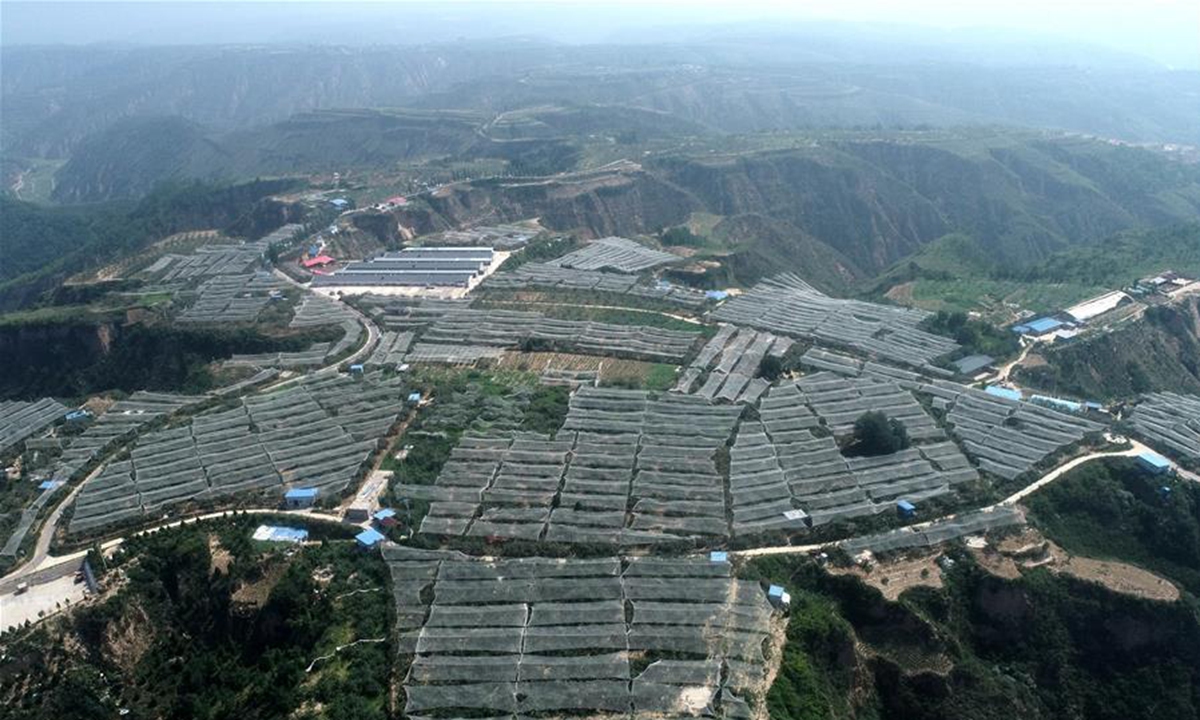
Aerial photo taken on July 29, 2020 shows an apple orchard in Liangjiahe Village of Yanchuan County in Yan'an, northwest China's Shaanxi Province. Photo: Xinhua
I was standing on top of a mountain in Nangou village, Yan'an city of Northwest China's Shaanxi Province, on July 29. Looking around, I saw large tracts of apple orchards amid exuberant trees. This place was once the cradle of the Chinese revolution. The Communist Party of China led by late Chairman Mao Zedong moved first to Xibaipo in Hebei and finally to Beijing to lead the whole country starting right from here.
After approximately one hour's drive along the highway in the mountains, we arrived at another village called Liangjiahe. Chinese President Xi Jinping was the secretary of Party branch of this village over 40 years ago.
I have tried to explain in many of my articles why Western elites until today still don't understand China's development policies. Standing in front of the "house cave," or "yaodong," where Xi once lived, I suddenly realized that the chapter of Yan'an is missing in the theories that Western elites rely on to observe and analyze China.
A recent article entitled "'Industrial Policy' Is Back: The West Dusts Off Old Idea to Counter China" said that "The US and its allies have long pressed China to stop helping favored industries with subsidies, government preferences and other interventions. Now they are beginning to copy it."
After the trip to Yan'an, I want to say: Even if Washington adopts some practices similar to those that China has adopted, policymakers in the White House will never be able to grasp the essence of China's development experiences. This is determined by their worldview and experiences.
Four decades ago, both Nangou and Liangjiahe were very poor villages, with an annual per capita income of less than 100 yuan ($15.46 at current exchange rate). Today, the per capita disposable income of Nangou is already over 15,000 yuan, and in Liangjiahe it is nearly 20,000 yuan.
The amount, though rising rapidly, is still very low in comparison to that in the developed countries. This means that China still has a long way to go before it truly realizes its national rejuvenation. China needs to continue to make increasing universal incomes its priority. This is the base for determining China's national policies, including its relations with the US.
When discussing with African envoys and diplomats in China who were on the same trip with me, I noticed they were particularly interested in two changes. One is that 60 percent of the poor people in Yan'an have gotten rich by cultivating apples.
Another one is that in the process of alleviating poverty, Yan'an has returned farmland into forest. This has contributed to making the city one of the greenest in China. Its local annual rainfall is more than 200 millimeters higher than it was 40 years ago.
The trip organized by the Beijing-based China-Africa Institute was mainly to investigate and explore China's experience in poverty alleviation with diplomats from African countries. The first piece of experience is the spirit of hard work. Second, local authorities and the public have taken flexible and active moves that are in line with local conditions. This has converted the "transfusion mechanism" into a "hematopoietic mechanism."
And what works behind this is China's political system. Precise and large-scale investment and related policy reform - all these combined - have unleashed unprecedented enthusiasm for development.
As a result, many of these experiences are difficult to separate and be used for reference. The cultivation of apples in Yan'an, for example, is related to agricultural research and government investment and organization.
Most importantly, this is not just for poverty alleviation, but also for many aspects of industrial, financial and technological development. In particular, when a policy is formed, it will be implemented effectively from the central government to the local governments at all levels.
During the discussion, African envoys and diplomats spontaneously mentioned Xi's relationship with Liangjiahe. They learned that Liangjiahe used to be a village that was even poorer than many villages in Africa. Hearing this, they began to understand why a Chinese leader, who had come from the bottom and had personal experience of living in the poorest region in the country, attaches so much importance to common prosperity.
Oftentimes, knowing where a country's leader came from and what he or she went through in his or her early years will help us get a more accurate picture of his or her political pursuits. For example, US President Joe Biden's father was rich in his early years, then declined, but managed to maintain a middle-class lifestyle for his family. And Donald Trump, Biden's predecessor, was born in a family of real estate moguls. This has a certain influence on their policies when they are in office.
To this day, when Western scholars observe or try to understand China's development, although they see the role of the system, they easily regard it as the opposite of the West. They deliberately or unintentionally ignore the relationship between China's policies and the system. In particular, they often ignore where the confidence of China's leaders in the countries' development direction comes from.
The author is a senior editor with People's Daily, and currently a senior fellow with the Chongyang Institute for Financial Studies at Renmin University of China. dinggang@globaltimes.com.cn. Follow him on Twitter @dinggangchina




